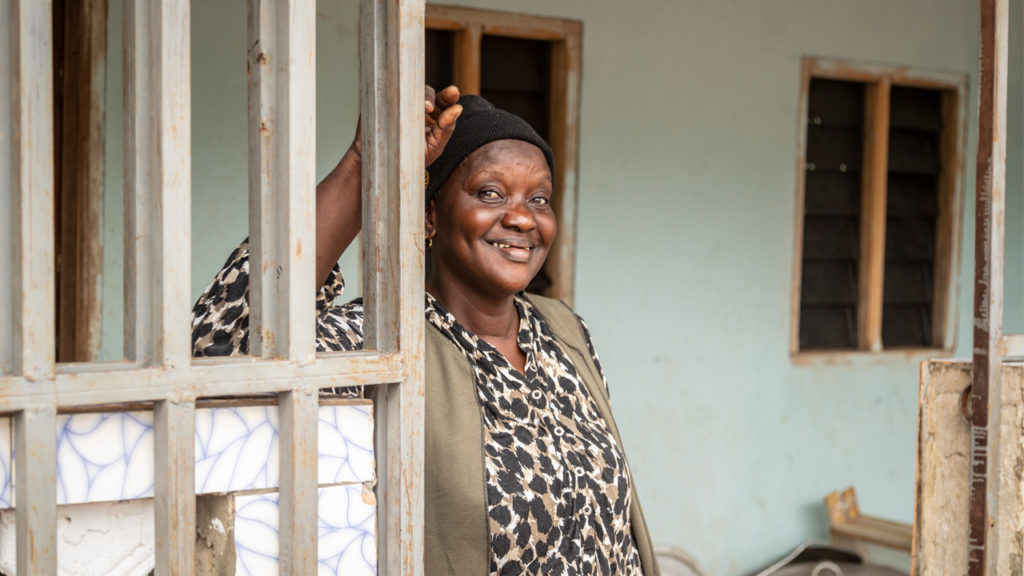Diakete Salimata, aged 49, is a member of the SCAANIAS cocoa co-operative and based in a small village near the city of Abengourou in Côte d’Ivoire. Despite the community being beset by many challenges, the women have come together to create opportunities for everyone.
Life is hard for women in cocoa growing communities. They work all day toiling on their farms, trying to combat crop diseases and pests, on top of the many laborious tasks involved in cocoa farming. They are also usually responsible for caring for their children. There is no water in the village, so a large amount of time is spent walking to collect it. Many women traditionally also still don’t own land officially nor have much say in decision-making within their communities – but an initiative set up by Fairtrade Africa is changing all of that.
When Salimata decided to take part in Fairtrade Africa’s Women’s School of Leadership (WSOL) the mother of eight was already an entrepreneur: as well as running a cocoa farm she has a small-scale poultry and fish farm. When Salimata joined its training programme, she suffered from a real lack of self-confidence and a fear of speaking up and expressing herself, which inhibited her leadership abilities. Salimata overcame this fear of public speaking with the support of fellow SCAANIAS co-op member and WSOL student, Kouao Amah. Taking part in the programme restored her self-confidence, so she could express herself and grow as a leader. She says: ‘If I hadn’t done the training, I would have stayed in my corner and not woken up. I used to be in a pit and now I’m free.’
She also gained practical skills in financial management and now Salimata is part of a group of women running a cassava processing facility creating acheke, a couscous-like staple food to sell at the local market. This is bringing in extra income for the women that they can control, providing them with vital reserves when times are tough. While the women’s group was initially formed many years before the co-op became Fairtrade certified, it hadn’t been running any income generation activities: but taking part in the programme inspired Salimata to kick start it again. As she says: ‘After undergoing the Women School of Leadership training, I felt motivated to gather the women together again to resume our activities. We’re now very active in our production and we’ve been going for one year now. At first the other women weren’t convinced they wanted to participate but I convinced them of the benefits of joining the project. We agreed to start it up again.
‘We all produce cassava but we’d actually sold it all already when we resumed the processing business, so we had to buy cassava in. This year we’ve grown a lot more.’
This increase in income allows the women to save money for themselves, which they hope will help with caring for the whole family, paying their children’s school fees, and expanding their business. For example, extra revenue means they can pay seasonal workers, grow more cocoa and increase productivity.
‘We now work together in synergy. This helps us feel empowered, tire ourselves less and work together. We exchange opinions and share tasks. We support each other, share our problems and find a common way through. Do I feel differently now we are working together as a unit? Yes, it’s totally different for me,’ Salimata says.
Cocoa crops are frequently threatened by swollen shoot disease and black pod – a type of rot caused by fungus – and the farmers are trained by Fairtrade Africa to reduce outbreaks. By replacing the use of agrochemicals with new pruning techniques, co-ops see less disease and pests are becoming more rare. The monetary value of the change in their farming techniques has resulted in a 50% increase in yields.
Despite this success and newfound confidence, the women still face several challenges: primarily, the need to sell more cocoa under Fairtrade terms. Only with the Fairtrade Premium – the additional sum of money earned from selling Fairtrade cocoa – will the village be able to purchase and build the well that they desperately need. That’s why Fairtrade will continue working alongside women like Salimata, helping them to thrive in all they do.
Support women cocoa farmers like Salimata by choosing Fairtrade chocolate.
Find out where to buy Fairtrade chocolate
Read ‘The invisible women behind our chocolate’ report (pdf)
